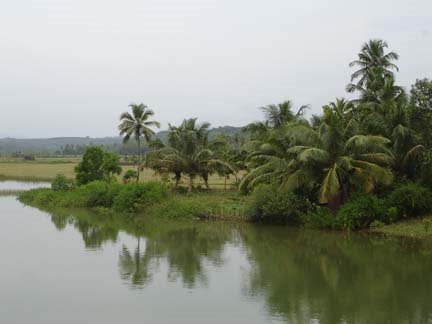Some of my
friends who write in Tulu language these days are getting fastidious about the
purity of the expressed Tulu language. They make extraordinary efforts to
filter out usage of words derived from other languages like Sanskrit in
Tulu. These efforts appear ludicrous to
people like me since there are no language that can claim itself as pure. All
languages in the world have grown and evolved after absorbing words and features
from other contemporaneous languages and cultures that came into their sphere
of influence. And Tulu is not an exception to this rule.
The Tulu
language has been classified as South Central Dravidian by linguists.. The
reason for differentiation from other proximal and coexisting southern Dravidian languages
(like Tamil, Kannada, Telugu, Malayalam etc) is that Tulu has absorbed a good share
of antique words derived from the ancient languages of India like Prakrit and
Austro-Asiatic Munda during the course of its evolution. Even though such features of assimilation has been evident in other coexisting languages also, the effect of homogenization within the languages has masked the evidences.
Tulu words ending with vowel o
Tulu has
abundant words that end with the vowel o (pronounced ‘oh’) as in the example “pātero” which means a spoken language or
a dialect. In some parts of the Tulunadu (ie traditional Tulu speaking areas),
like around Udupi and Karkal, the alternate form of the same word “pātera” has also survived. It appears that adding o at the end has been
a standard practice for many Tuluvas knowingly or unknowingly. For example, a
standard word like Bhārata (ie India)
is usually modified as “Bārato” in
some of the Tulu circles, imparting the cultivated impression that adding o at the
end is mandatory in Tulu .
In other
Dravidian languages in the vicinity like, Kannada or Tamil or Malayalam this
practice of adding o at the end of words apparently does not exists.
Then when
and where from the Tulu language acquired this specific feature?.
Prakrit based languages
The Prakrit
and the Prakrit derived languages have ample words ending with o. Emperor Ashoka’s edict dated ca.250 BC was in
Prakrit/Pāli which was the administrative language in larger part of India. During
the history, accordingly, the Tulu and Kannada speaking areas were under the
influence of Prakrit (or ruled by kings wherein the common administrative
language of the day was variants of Prakrit/Pāli (probably along with Austro-Asiatic
Munda languages) up to around third or fourth century CE. In order to compare
and to trace the source of words ending with 0 in Tulu we can compare a few
random words current in Prakrit derived languages of the Northern India like
Hindi and Bengali.
Hindi words ending with o.
Random word samples
from Hindi, for example, like: “aao, naacho, gaavo” would clarify the nature
of Prakrit derived Hindi words associated with vowel o at the end.
Aavo= come
Naacho= dance
Gaavo= sing
Bengali words with o
In Bengali
we can find the presence of added o not only at the end of words but also
within words. Check the following Bengali word samples.
(a)Samples of Bengali words ending with o:
Pujo
(puja =worship)
Borno (varna=color/alphabet)
Samajo (samaja=society)
Also personal names like Supriyo, Arko etc.
(b) Samples of Bengali words with internal o:
Porichoy (parichay= acquaintance)
Bonomali (Vanamali=gardener)
Shomay (samay=time)
Jol (jal=water)
Roy (Rai=king)
Mondal (mandal=division)
Chakraborty (Chakravarthy=emperor/ a
surname)
Danonjoy (Dhananjay; a personal name)
Unlike
in Bengali, in Tulu language the words have an added vowel of o only
at their ends.
Prakrit influence on Tulu
In
the overall analysis, we may conclude that the special feature of the Tulu words
ending with a vowel of o has been acquired during contact with speakers of
Prakrit languages. We can make further detailed analysis when direct
resources from the Prakrit languages were available.
R



No comments:
Post a Comment